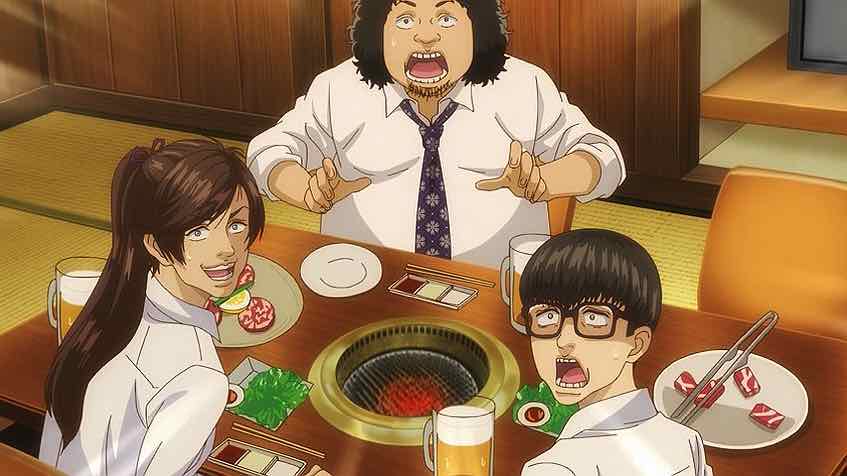A common thread of this finale week is shows I didn’t cover (at least fully) and wound up loving. Unlike Okitsura I did pick up Trillion Game (at about the midway point) and I’m certainly not sorry I did. Not only did this turn out to be an excellent series, but a fruitful one to write about. It’s almost hard to believe it’s the same author as Dr. Stone, so much more highly do I rate the writing here. There were two Madhouse Fall 2024 series I wound up covering, but Trillion Game winding up my favorite of the two – and by a decent margin too – is a major upset.
I also followed the Netflix drama version of this series (TsudaKen common to both). And the differences are interesting. I like both a lot though – as usual – I find the acting better in the anime (including Tsuda’s). Some stuff was shifted around, but the big difference is that the anime cut an arc which I thought it might – though I’ll talk more about that later. The Mithril phone drama, however, was a pretty climactic moment in both (though it came earlier in the live-action version).
Parallels are obviously being drawn between Haru-Gaku and Kunugi-Akari here. And they’re not entirely misplaced by any means. But one pretty significant difference is that, for the most part, Haru doesn’t try to shield Gaku from the ugly side of this business. There have certainly been moments – him not telling Gaku that the game development was a diversion, for example. But if nothing else Haru seems to have learned from that incident to an extent. Kunugi is still trying to protect Akari and keep her “pure”. There’s no doubt a chauvinistic component to that, but also a hard and practical one. Akari is his biggest asset, and her image is everything to her value.
Image is what a lot of this is about. Kunugi realizes it’s what Haru is chasing – the respectability a news division offers Trillion TV, a tool to lure advertisers. Kunugi isn’t offended that Haru is all about Yen – he’s all about ratings. They’re both “scumbags” in their own estimation. But one lesson Haru learned from the “Pop-Pop Land” scenario is that if you actually kill it with the bait, it’s a double-win. The game itself was the means to take over God Promo, but the game’s success was the means to start Trillion TV. Win-win – just like his partnering with Kunugi is a win-win.
Akari is Kunugi’s trump card, and Gaku is Haru’s. Because Trillion TV is not a terrestrial station, they’re allowed to pay for net-submitted videos. Kunugi protests that they’ll be swamped with fakes, but Gaku figures he can use their AI to weed most of them out and make it manageable for human eyes to make the final determination. It’s a classic Haru-Gaku team-up – the scumbag sees the possibility, the genius makes it practical. Kunugi is a bit of a news savant to boot, which makes this a fearsome foursome where streaming news is concerned.
They come up with some good stuff this way (anyone catch the Kusuriya crossover?). But the moment of truth (so to speak) comes when they get a submission showing the new Mithril (one of Kawara’s largest sponsors) phone exploding after being charged off a generator. When Kunugi takes this to Mithril their exec (Koyasu Takehito) first tries to write if off as human error, and then plays the sponsor card. Kunugi figures he can get away with it by making the story a Trillion-only exclusive, but the suits put the onus squarely on Akari and he to choose journalism or self-preservation.
It’s quite the cliffhanger, though with both episodes airing this week not so much as it would have been. Akari chooses the safe route – she reads the cat rescue story (and who doesn’t love cat rescues). Regardless of how this will eventually turn out, that’s an interesting moment. That’s unethical, there’s no two ways about it – understandable though it is. Akari had no idea Haru would save the day (and she doesn’t yet know him as we do). But save the day he will, because he always has a backup plan and balls of steel.
Make no mistake, what Haru does (even setting aside the fact that it was mostly a bluff) is unethical too. It’s still a quid pro quo – he’s giving a dishonest company a chance to look good in exchange for a bunch of ad revenue. He’s also protecting the public in the process which is certainly a mitigating factor, though just how much of a priority that is for Haru is obviously subject to debate. It’s masterfully played, no question – especially given that it seems to be improvised. Anyone in Trillion’s position here does have a massive point of leverage – the truth coming out would be terrible for Mithril. It’s just that the vast majority would be too scared to use it.
Once he gains the upper hand, Haru plays it to the max. He gets the ad buy, he gets Mithril to buy a bunch of generators for municipalities (which Trillion TV will report on exclusively of course). He even gets the zombie apocalypse he was asking for in the form of a massive typhoon slamming into Kanto, though that one mostly comes down to luck. Because Haru has played his chips brilliantly and because Gaku has prepared like the ant and not the grasshopper, Trillion TV is ready to handle the massive opportunity this presents for a media company that mostly pushes content through cell phones.
Now, to get back to that course change the anime took. I won’t go into too much detail because some of you might want to watch the drama or read the manga, but the skipped arc involves Trillion TV and D-Rex doing battle over the streaming rights to a thinly-disguised Studio Ghibli clone. I always felt like this might be too much of a third rail, especially as it delves into the topic of using AI for anime production. It’s a shame as it’s a hell of a story, but I never really expected the anime to adapt it.
As to what the anime does choose to end with, I don’t know if that was an anime-original or not. We get a “several years later” timeskip, and it turns out Gaku and Haru split up after a fight. Except it was staged as part of a plan for Haru to go to America and work to infiltrate the world’s tech behemoths. It comes across as rather sudden here, and there are a lot of characters who don’t get a mention in the series’ denouement. But when you’re adapting ongoing manga that’s an occupational hazard. It works as a modestly satisfying ending and as a transition, which is probably about the best we could have hoped for.
On balance Trillion Game wound up as an extremely engaging piece of work. The sort of entrepreneurialism it chronicles is not the standard issue in Japan – it’s very much a “nail that sticks up” kind of attitude. The series works as a premise and it works as a character piece. As I said earlier, this show shares some of Golden Kamuy’s quality of every supporting character being written as if they were the protagonist of their own show. Fall was a big season for series about working adults, and Trillion Game was one of the best of the bunch. It was a bit of a slow build, but the final construction was a beautiful piece of work.
The post Trillion Game – 25/26 (End) and Series Review appeared first on Lost in Anime.




